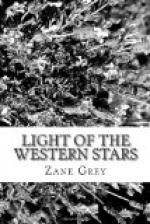“I like the country, and I like the men,” went on Edith. “One reason I want to go home soon is because I am discontented enough at home now, without falling in love with the West. For, of course, Majesty, I would. I could not live out here. And that brings me to my point. Admitting all the beauty and charm and wholesomeness and good of this wonderful country, still it is no place for you, Madeline Hammond. You have your position, your wealth, your name, your family. You must marry. You must have children. You must not give up all that for a quixotic life in a wilderness.”
“I am convinced, Edith, that I shall live here all the rest of my life.”
“Oh, Majesty! I hate to preach this way. But I promised your mother I would talk to you. And the truth is I hate—I hate what I’m saying. I envy you your courage and wisdom. I know you have refused to marry Boyd Harvey. I could see that in his face. I believe you will refuse Castleton. Whom will you marry? What chance is there for a woman of your position to marry out here? What in the world will become of you?”
“Quien sabe?” replied Madeline, with a smile that was almost sad.
* * *
Not so many hours after this conversation with Edith, Madeline sat with Boyd Harvey upon the grassy promontory overlooking the west, and she listened once again to his suave courtship.
Suddenly she turned to him and said, “Boyd, if I married you would you be willing—glad to spend the rest of your life here in the West?”
“Majesty!” he exclaimed. There was amaze in the voice usually so even and well modulated—amaze in the handsome face usually so indifferent. Her question had startled him. She saw him look down the iron-gray cliffs, over the barren slopes and cedared ridges, beyond the cactus-covered foothills to the grim and ghastly desert. Just then, with its red veils of sunlit dust-clouds, its illimitable waste of ruined and upheaved earth, it was a sinister spectacle.
“No,” he replied, with a tinge of shame in his cheek. Madeline said no more, nor did he speak. She was spared the pain of refusing him, and she imagined he would never ask her again. There was both relief and regret in the conviction. Humiliated lovers seldom made good friends.
It was impossible not to like Boyd Harvey. The thought of that, and why she could not marry him, concentrated her never-satisfied mind upon the man. She looked at him, and she thought of him.
He was handsome, young, rich, well born, pleasant, cultivated—he was all that made a gentleman of his class. If he had any vices she had not heard of them. She knew he had no thirst for drink or craze for gambling. He was considered a very desirable and eligible young man. Madeline admitted all this.




